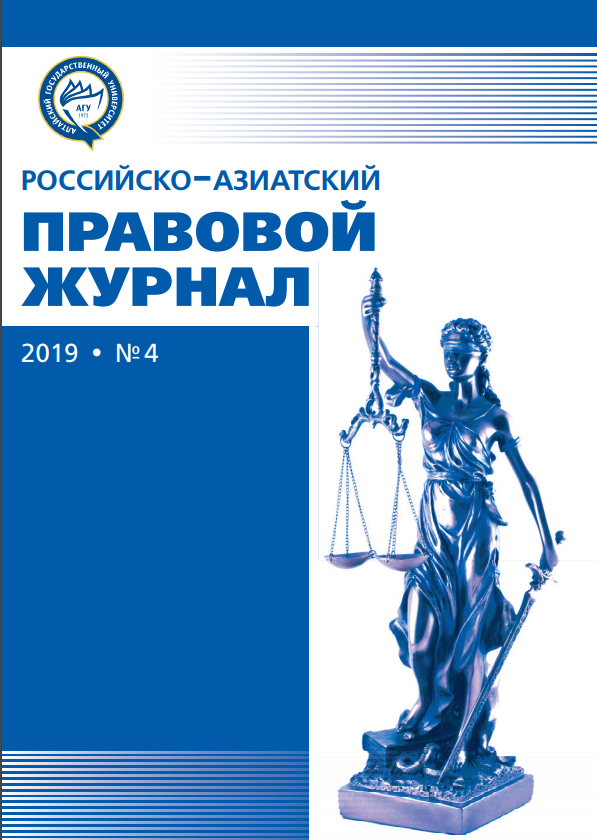VIOLATIONS OF THE RIGHTS OF PERSONS AFFECTED BY CRIMES
УДК 343.122 ББК 67.410.02
Abstract
The article discusses the most common methods and forms of violation of constitutional and proceduralrights of certain categories of persons affected by crimes. Attention is drawn to the causes of these violationsby persons who are called upon to protect persons whose rights and legitimate interests have beenviolated. Based on the study of materials of judicial investigative practice, certain categories of personsare distinguished whose constitutional and procedural rights are violated more often in comparison withother categories. Based on the isolation of various criteria, the article considers categories such as minorsand juveniles; foreign citizens; persons serving a sentence of imprisonment; women affected by domesticviolence. Particular attention is paid to victims of crime in places of execution. This category of persons isthe most vulnerable due to the special legal situation determined by the conditions of isolation from society.The study of the problem of violations of the rights of persons affected by crimes will contribute to thedevelopment of measures aimed at the prevention of unlawful actions (inaction) of persons called to protectand respect these rights.
Downloads
References
2. Андрюхин Н.Г. Виктимизация и криминализация несовершеннолетних в аспекте национальной безопасности // Обеспечение национальной безопасности — приоритетное направление уголовно-правовой, криминологической и уголовно-исполнительной политики : материалы ХI Российского
Конгресса уголовного права, посвященного памяти доктора юридических наук, профессора Владимира Сергеевича Комиссарова, состоявшегося 31 мая — 1 июня 2018 г. М., 2018.
3. Ильяшенко А.Н. Типология лиц, пострадавших от насильственных преступлений в семье //
Российский следователь. 2005. №7.
4. Ривман Д.В. Виктимология. СПб., 2000.
5. Франк Л.В. Потерпевший от преступления и проблемы советской виктимологии. Душанбе,
1977.
6. Христенко В.Е. Психология поведения. Ростов-н/Д., 2004.
7. Щерба С.П., Зайцев О.А., Сареенбаев Т.Е. Охрана прав беспомощных потерпевших по уголовным делам. М., 2001.
8. Психология : учебник для педагогических вузов / под ред. Б.А. Сосновского. М., 2005.
9. Кирюшина Л.Ю. Расследование преступлений, совершенных несовершеннолетними : учебное пособие. Барнаул, 2012.
10. Кирюшина Л.Ю. Роль семьи в формировании противоправного поведения несовершеннолетних // Обеспечение национальной безопасности — приоритетное направление уголовно-правовой,
криминологической и уголовно-исполнительной политики : материалы ХI Российского Конгресса уголовного права, посвященного памяти доктора юридических наук, профессора Владимира Сергеевича Комиссарова, состоявшегося 31 мая — 1 июня 2018 г. М., 2018.
Russian-Asian Law Journal is a golden publisher, as we allow self-archiving, but most importantly we are fully transparent about your rights.
Authors may present and discuss their findings ahead of publication: at scientific conferences, on preprint servers, in public databases, and in blogs, wikis, tweets, and other informal communication channels.
Russian-Asian Law Journal allows authors to deposit manuscripts (currently under review or those for intended submission) in non-commercial, pre-print servers such as ArXiv.
Authors who publish with this journal agree to the following terms:
- Authors retain copyright and grant the journal right of first publication with the work simultaneously licensed under a Creative Commons Attribution License that allows others to share the work with an acknowledgement of the work's authorship and initial publication in this journal.
- Authors are able to enter into separate, additional contractual arrangements for the non-exclusive distribution of the journal's published version of the work (e.g., post it to an institutional repository or publish it in a book), with an acknowledgement of its initial publication in this journal.
- Authors are permitted and encouraged to post their work online (e.g., in institutional repositories or on their website) prior to and during the submission process, as it can lead to productive exchanges, as well as earlier and greater citation of published work (See The Effect of Open Access).








